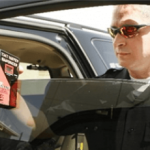OPINION
Per Curiam.
In this forfeiture action, claimant appeals as of right an order granting forfeiture of his vehicle. We affirm.
This action arises out of the forfeiture of claimant's vehicle when claimant was seen driving his vehicle to a known drug trafficking house and then admitted to the police that he traveled to the house to purchase crack cocaine. On appeal, he argues that there was insufficient evidence to seize his vehicle because nothing was found in the vehicle or on his person. We disagree.
Any challenge to the sufficiency of the evidence in a civil case is waived by a party's failure to raise the issue in a timely motion at trial. Shaw v Ecorse, 283 Mich App 1, 22; 770 NW2d 31 (2009). Claimant did not challenge the sufficiency of the evidence before the trial court, so this issue is waived.1 Nevertheless, we will briefly address the merits of the claim.
1 In addition, claimant failed to adequately support his position on appeal. "It is not enough for an appellant in his brief simply to announce a position or assert an error and then leave it up to this Court to discover and rationalize the basis for his claims, or unravel and elaborate for him his arguments, and then search for authority either to sustain or reject his position." Mitcham v Detroit, 355 Mich 182, 203; 94 NW2d 388 (1959). Although, claimant asserts there was insufficient evidence to support the order of forfeiture, he does not cite to relevant legal authority for this proposition. Claimant also attempts to make arguments that the arresting officer abused his discretion in seizing the vehicle and that the judge erred in not finding claimant credible, without citing to any authority. Accordingly, we conclude his arguments are abandoned on appeal.
When reviewing a challenge to the sufficiency of the evidence in a civil matter, this Court views the evidence and all legitimate inferences in a light most favorable to plaintiff. Badalamenti v William Beaumont Hospital-Troy, 237 Mich App 278, 284; 602 NW2d 854 (1999). Questions of credibility are left to the trier of fact and will not be resolved anew by this Court. See Allard v State Farm Ins Co, 271 Mich App 394, 406-407; 722 NW2d 268 (2006).
MCL 333.7521(1)(d) provides that a vehicle is subject to forfeiture if it is "used or intended for use, to transport, or in any manner to facilitate the transportation, for the purpose of sale or receipt of" a controlled substance. Here, the testimony at the forfeiture hearing established that claimant parked the forfeited vehicle in front of a house known for trafficking drugs. A short while later claimant left the home and drove away in his vehicle. A police officer stopped claimant and asked him about the house he had just left. The officer testified that claimant told him that he went to the house to purchase crack cocaine on credit, but the drug dealers were not issuing credit at that time. At the hearing, claimant admitted telling the officer that he went to the house asking for drugs. Claimant also admitted that he had purchased drugs at the house on prior occasions. Claimant stated that he was "thinking out loud" and was "a little facetious," when making the statement to the officer. He also stated that he was really at the house to pick up a friend or possibly some music. However, the trial court did not find claimant's testimony credible. Viewed in the light most favorable to plaintiff, sufficient evidence was presented for the trial court to find that the vehicle was subject to forfeiture under MCL 333.7521(1)(d).
Affirmed.
/s/ Peter D. O'Connell
/s/ Mark J. Cavanagh
/s/ Karen M. Fort Hood





